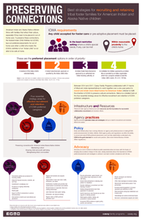Displaying 1431 - 1440 of 2221
Child welfare agencies are tasked with investigating allegations of child maltreatment and intervening when necessary. Researchers are turning to the field of predictive analytics to optimize data analysis and data-driven decision making. This paper examines the utility of statistical algorithms in predictive analytics.
This brief guide from Casey Family Programs lays out strategies for recruiting and retaining tribal foster families for American Indian and Alaska Native children, ensuring that indigenous children can stay in their communities.
The American Civil Liberties Union (ACLU) has filed a lawsuit in US district court against federal immigration agencies that have separated a Congolese woman, given the pseudonym "Ms L" in court documents, and her daughter, according to this article from the Guardian.
According to this article, and radio segment, from NPR, there are about 1,200 children on the Navajo indigenous reservation in the US who cycle in and out of foster care each year, but only 26 registered foster care homes.
This study examined the extent to which (a) maltreatment type and (b) foster care placement were associated with the educational attainment of 337 maltreated adolescents.
The authors of this study sought to better understand the potential strengths and challenges of medical foster care (MFC) as a placement setting for children with chronic critical illness (CCI).
The current study presents findings from a survey of child welfare caseworkers' experiences with reunifications and focuses on practices and key factors at the casework practice and at the system-environment level to assist in achieving successful reunification.
This study analyzes semistructured interviews of 15 foster parents on how foster parents perceive the sibling relationships of youth in foster care and ways to promote these relationships.
UNICEF is seeking a Project Management Consultant in Child Protection.
In this sample of 160 retained specially-trained public child welfare workers and former students, sources of stress and satisfaction were examined three and five years after the conclusion of the students’ work obligation.

